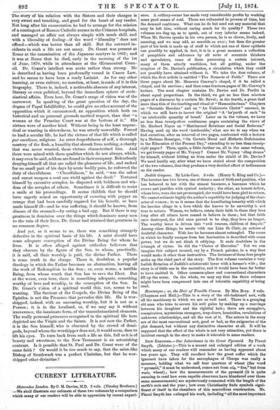CURRENT LITERATURE.
Heterodox London. By C. M. Davies, M.D. 2 vols. (Tinsley Brothers.) —We shall illustrate our estimate of these two volumes by a comparison which many of our readers will be able to appreciate by recent experi- ence. A colliery-owner has made very considerable profits by working some good seams of coal. These are exhausted in process of time, but the demand continues. What can he do but send out any material that may be left him, without caring much for its quality? These two volumes are dug up, so to speak, out of very inferior seams indeed. When Mr. Davies speaks in his own person, he is as clever, lively, and amusing, and we may add, as sensible as ever ; but then the greater part of his book is made up of stuff to which not one of these epithets can possibly be applied, in fact, it is in a great measure a collection of pamphlets and addresses by all sorts of eccentric thinkers and speculators, some of them possessing a certain interest, many of them utterly worthless, but all getting, under the auspices of Dr. Davies's publication, a circulation which they could not possibly have attained without it. We take the first volume, of which the first article is entitled "The Nemesis of Faith." There are three pages about Mr. Moncure Conway's chapel, if it be called a chapel, and its services ; and then come fourteen pages of Mr. Conway's lecture. The next chapter contains Dr. Davies and Dr. Perfitt in about equal proportions. In the third, we get no less than nineteen pages of a discourse by a certain Mr. Revel ; in the fourth, a great deal more than this of the teaching and ritual of " Humanitarians." Chapters on "Sociable Heretics" and on "An Unhistoric Christ" succeed, in which we still have to invert the original "A ha'porth of sack " to an intolerable quantity of bread.' Later on in the volume, we have no less than twenty-three continuous pages containing the views of Mr. Herbert Noyes on " Matrimonal Relations and Social Reforms." Having used up the word 'intolerable,' what are we to say when we find ourselves, after an interval of two pages, confronted with a lecture by a Madame Ronniger, "On Certain Moral and /Esthetic Deficiencies in the Education of the Present Day," extending to no less than twenty- eight pages ? Then, again, a little farther on, all in the same volume, we get twenty pages of Mr. Voysey ? Cannot Mr. Voysey sling stones' for himself, without hitting us from under the shield of Dr. Davies ? We need hardly say, after what we have stated about the composition of the two volumes, that they produce a very decided effect of tediousness on the reader.


































 Previous page
Previous page